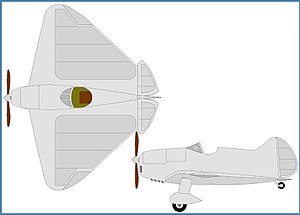Payen AP.10
| Payen AP.10 | |
|---|---|

| |
| Role | Experimental aircraft |
| National origin | France |
| Manufacturer | Payen |
| First flight | 1936 |
| Number built | 1 |
The Payen or Aubrun-Payen AP.10 was an experimental aircraft designed and built in collaboration with Nicolas Roland Payen in the 1930s.[1]
Design
The AP.10 was a tailless single-seat aircraft of reverse-delta configuration. In this it differed markedly from Payen's extensive line of sharply-swept delta canard designs.
Specifications
Data from [2]
General characteristics
- Crew: 1
- Length: 4.16 m (13 ft 8 in)
- Wingspan: 4.95 m (16 ft 3 in)
- Height: 1.86 m (6 ft 1 in)
- Wing area: 10.00 m2 (107.6 sq ft)
- Empty weight: 200 kg (441 lb)
- Gross weight: 340 kg (750 lb)
- Powerplant: 1 × Train inverted air-cooled in-line piston engine, 30 kW (40 hp)
Performance
- Maximum speed: 200 km/h (120 mph, 110 kn)
- Range: 900 km (560 mi, 490 nmi)
- Service ceiling: 5,000 m (16,000 ft)
References
- ^ Pelletier, Alain J. (March–April 1997). "Paper Darts to Deltas: The Designs of Roland Payen". Air Enthusiast. No. 68. p. 35. ISSN 0143-5450.
- ^ "Payen AP.10". Aviafrance.com. Retrieved 8 February 2019.
